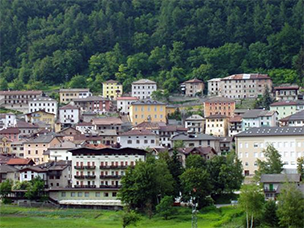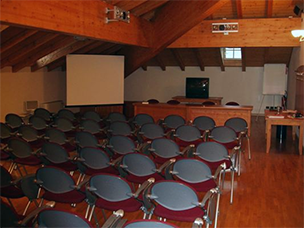UNITUS International Summer School on
Design of sustainable food systems
UNITUS Alpine Studies Centre of Pieve Tesino, Italy
5th-16th July 2021
The summer school on “Design of sustainable food systems” arises from the growing attention that the issue of sustainability of food systems is gaining at international level. The Farm-to-Fork strategy launched by the European Union in 2020 brings agri-food issues to the heart of the European Green Deal, pushing for a transition of food systems towards a condition of sustainability that can lead environmental, social and economic benefits. This approach aims to contribute to the achievement of the Sustainable Development Goals (especially SDG 12: sustainable production and consumption).
The in-depth knowledge of these issues by students enrolled in courses dealing with the agri-food sector will be essential to allow them to work towards this transition in the next future. The objective of the summer school is to provide students of the three promoting Universities (University of Tuscia, Viterbo, Italy; Swedish University of Agricultural Sciences, Uppsala, Sweden; University of Natural Resources and Life Sciences, Wien, Austria) the theoretical overview and a basic toolbox to design and assess sustainability in agri-food systems, in an international environment.
The summer school will be held at the UNITUS Alpine Studies Centre, located in the small village of Pieve Tesino, in the mountains of Trentino, Italy, during the first two weeks of July 2021.
|

|

|
|
Aerial view of Pieve Tesino (left) and classroom of the study center (right).
|
The Summer School is based on an interactive programme of lectures, seminars, field visits and workgroups to explore key issues linked to the sustainability of food systems.
Major thematic topics reflect the four-pillar approach of the Farm-to-Fork EU strategy, thus combining sustainability of production, food processing and distribution, sustainable consumption styles and prevention of food waste. The full program of the activities is shown in the table below. Lectures will be given by professors from the three Universities promoting the summer school, and by selected invited speakers.
|
Days
|
Activities
|
Hours
|
|
4 July
(SUN)
|
Participants arrival and CSALP rules explanation
|
All day
|
|
5 July
(MON)
|
Welcome session and ice-breaking
|
Morning
|
|
Lecture: The concept of sustainability and its application to food systems
|
Afternoon
|
|
6 July
(TUE)
|
Lecture: Foods and different supply chains models
|
Morning
|
|
Lecture: System- and life cycle- assessment: how to measure sustainability in food systems?
|
Afternoon
|
|
7 July
(WED)
|
Lecture: Food processing innovations
|
Morning
|
|
Lecture: Modern technological strategies to boost a sustainable Food System
|
Afternoon
|
|
8 July
(THU)
|
Field visit to local food company/ies or cooperatives
|
All day
|
|
9 July
(FRI)
|
Lecture: Data and statistics about sustainability of food systems
|
Morning
|
|
Launch of group works
|
Afternoon
|
|
10 July
(SAT)
|
Organised touristic visit: City or lake
|
All day
|
|
11 July
(SUN)
|
Discovering the Tesino area: Trekking/museum/walk
|
All day
|
|
12 July
(MON)
|
Lecture: Waste management as a critical issue for food systems
|
Morning
|
|
Group work
|
Afternoon
|
|
13 July
(TUE)
|
Lecture: to be defined
|
Morning
|
|
Lecture: Food waste drivers and prevention measures along the supply chain
|
Afternoon
|
|
14July
(WED)
|
Field visit to local food company/ies or cooperatives
|
All day
|
|
15 July
(THU)
|
Lecture: The European Green Deal and the challenges of sustainable food systems
|
Morning
|
|
Group work
|
Afternoon
|
|
16 July
(FRI)
|
Final exam
|
Morning
|
|
Get together (farewell party)
|
Evening
|
|
17 July
(SAT)
|
Departure
|
Morning
|
The summer school will be residential (using the premises of the Alpine Studies Centre) both for students and for lecturers, thus being a full experience of discussion and networking in the beautiful environment of Trentino.
The language of the summer school is English.
Thanks to the funding provided by the Internationalization Program of the University of Tuscia, the registration is free and it includes:
- All lectures and seminars;
- Participation to the field visits;
- Accommodation at the Alpine Studies Centre from the 4th of July (arrival) to the 17th of July (departure) 2021;
- Coffee breaks;
- Dinners at the local restaurant;
- Course materials;
- Touristic tours organised during the weekend 10th-11th July 2021.
The summer school has 25 places for students. The admission criteria are the following:
- Being enrolled in a bachelor, master or doctoral course at University of Tuscia or Swedish University of Agricultural Sciences or University of Natural Resources and Life Sciences, in the academic year 2020/2021. Based on availability of places, applications of students from other Universities will be considered up the total maximum number of 25 students;
- Working knowledge of English (self-assessed).
The registration procedure for the selection will start from 1st March 2021 and will end on 30th April 2021. Applicants shall send the following documents, via email, to foodsummerschool@unitus.it :
- Signed application form (available at the following link)
- Motivational letter (in English)
- Transcript of records with exams and grades
- English language certificate or a self-certification
- Front-back copy of a valid identity document
Any application received after the deadline of 30th April 2021 will be considered only if there are positions left to reach the maximum number of places available.
Successful applicants will be notified via email by 14th May 2021. The selection of the students will be based on their academic performance found in the transcript of records and on their motivational letter. The selection will also consider the geographical origin of the applicants to favour an international dimension of the classroom. Admitted students will be required to confirm their participation via email. The summer school will take place if a minimum number of 10 participants is reached.
In May 2021 the organisers will assess the feasibility of the event considering the local, national and international Covid-19 restrictions.
|